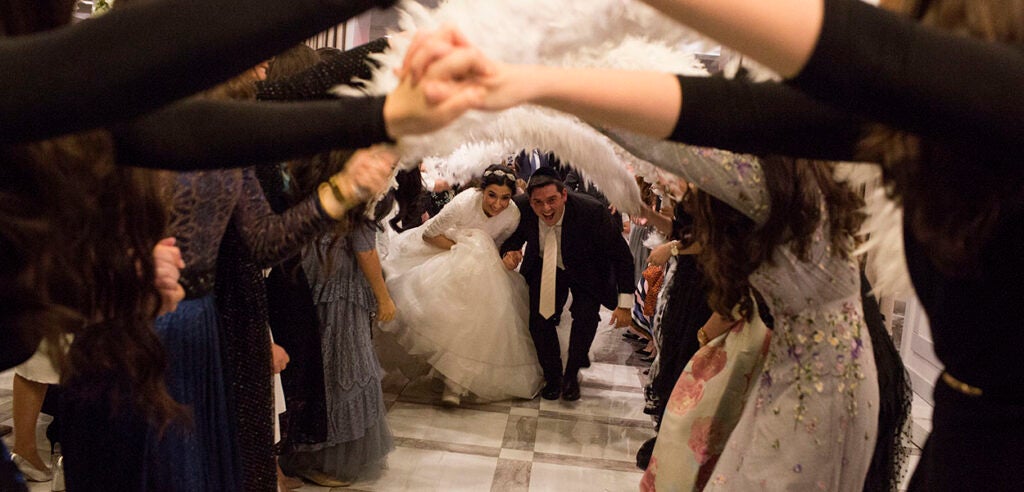I write this week as a very different man than I was when writing my last column. Then, I was merely engaged; now, after the single greatest week of my life culminated in the single greatest day and night of my life, I am married.
I am filled with immense, overwhelming gratitude. My wife and I are blessed with wonderful family and loyal friends—in America and across the world. We are surrounded by those who love and care for us, and we are not wanting for material comforts.
Perhaps most important, we are anchored by our Judaism and strive to live lives—and, God willing, build a family—rooted in a particular meaning and purpose, and guided by a particular set of values and customs. Even at the very beginning of our lifelong journey together, we therefore already have everything we truly need.
Unfortunately, marriage these days is something of a countercultural phenomenon. According to a 2020 Pew Research survey, the percentage of 23- to 38-year-old Americans who are married steadily decreases by generation: 81% for the Silent Generation, 61% for baby boomers, 53% for Generation X, and 44% for millennials. The percentage of unmarried Americans 15 years or older has risen from 23% in 1950 to 34% in 2022.
No one should expect Gen Z to stem the tide, either. According to a Thriving Center of Psychology survey, 41% of Gen Z men and a whopping 52% of Gen Z women believe that marriage is an “outdated tradition.” Alas, what else would we expect from a generation hopelessly addicted to Chinese TikTok spyware and indoctrinated by left-wing activist teachers to think of the nuclear family as “patriarchal” and “repressive”?
Millennials and Gen Z are the “participation trophy” generations: They are the ones who came of age receiving trophies and accolades not for being victorious or otherwise triumphant, but for simply showing up and playing.
“Second place is just the first-place loser,” NASCAR legend Dale Earnhardt once said; “Everyone is always a winner,” respond the cosseted brats of Gen Z and Gen Y (millennials).
America has raised successive generations to believe demonstrably untrue things: Every person is of equal worth (not in the true sense that we are all God’s creations, but in the untrue sense that we are all of equal acumen, skills, and so forth); every culture and lifestyle is of equal dignity (including whether to marry and whether to raise children); and the only person who truly matters is “me” (and not one’s parents, grandparents, community members, countrymen, coreligionists, and so forth).
In short, we have raised successive generations to reject the meritocratic, values-based, and sacrificial lifestyle of yesteryear for the uber-egalitarian, nihilistic, and solipsistic lifestyle flaunted by today’s elites.
We have replaced the wisdom of traditional Judaism and Christianity with the moral relativism of the “Mystery Passage” from Planned Parenthood v. Casey (1992): “At the heart of liberty is the right to define one’s own concept of existence, of meaning, of the universe, and of the mystery of human life.” We have replaced the duty and altruism of the Greatest Generation—those who stormed the beaches of Normandy and risked life and limb for God, family, and country—with Ayn Rand’s “Virtue of Selfishness.”
No wonder, then, that marriage rates have been declining for so long. The very essence of the marital relationship—the fusing of two into one, the subordinating of the individual to the couple, learning to approach life’s challenges not as “me” but as “us”—is anathema to the “newer” ways of thinking. There is no “participation trophy” in marriage; there is teamwork, sacrifice for one’s spouse and children alike, and a mutual commitment to a specific (ideally religiously based) lifestyle.
Are millennials and Gen Z actually better off today for rejecting the tried-and-true ways of the past? Our skyrocketing rates of drug overdose, depression, and deaths of despair would seem to provide a clear answer: No.
As I said, although we will grow and learn, and although we will (hopefully) acquire more wisdom and material possessions alike, my wife and I at this earliest stage already have everything we truly need. We greatly look forward to what is to come in the many decades ahead.
And in our own small way, we hope to demonstrate a more viable and meaningful lifestyle than that pushed by societal elites today. Please pray for us as we embark on our journey.
COPYRIGHT 2023 CREATORS.COM
The Daily Signal publishes a variety of perspectives. Nothing written here is to be construed as representing the views of The Heritage Foundation.
Have an opinion about this article? To sound off, please email letters@DailySignal.com, and we’ll consider publishing your edited remarks in our regular “We Hear You” feature. Remember to include the URL or headline of the article plus your name and town and/or state.
